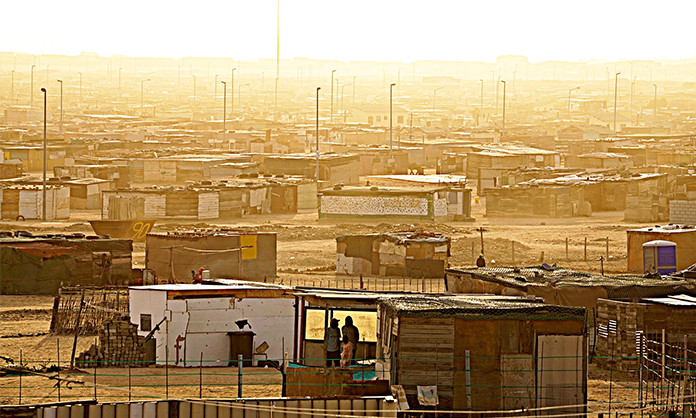The government has vowed to take action following an investigation by the Centre for Collaborative Investigative Journalism (CCIJ) into the nation’s dire sanitation crisis.
The CCIJ’s three-part story exposes the government’s failure to provide adequate access to safe toilets and hygiene facilities – a basic human right – to more than half the population.
With open defecation often the only option for many Namibians, the investigation reveals the shocking conditions citizens face, risking robbery, sexual assault and even wildlife attacks as they are forced to seek the privacy of the bush.
In addition to safety and dignity concerns, the report shows how these conditions also put many citizens – especially children – at risk of deadly fecal-oral diseases.
Namibia’s Ministry of Agriculture, Water and Land Reform has responded to the CCIJ’s report, admitting that the country is “not doing well”.
Elijah Ngurare, deputy executive director of water affairs, admitted that the report has “laid bare” the nation’s sanitation crisis, and said his ministry would invite reporters from the CCIJ to the government’s next sanitation intervention project – although he did not provide a date for this opportunity.
However, as the CCIJ investigation made clear, the water ministry does not have full ownership of implementing sanitation projects in the country.
SHARED RESPONSIBILITY
Seven ministries, alongside regional councils and local authorities, juggle this responsibility, complicating attempts to implement a coherent national strategy.
The United Nation’s Children’s Fund (Unicef) Namibia told the CCIJ that this contributed to poor coordination of the sanitation sector, something the government itself admitted in its fifth National Development Plan.
The ministry provided the CCIJ with the statement, outlining government plans to improve sanitation across the country.
The statement reaffirmed Namibia’s commitment to end open defecation and ensure sanitation for all by 2030, while restating the potential impacts of the multibillion-dollar Namibia Water Sector Support Programme (NWSSP) aimed at improving sanitation for over one million Namibians.
MINISTRY GOALS
The ministry’s statement also outlined several goals it plans to achieve this year.
These include plans for nationwide behavioural change and communication campaigns, the construction of 688 sanitation facilities and initiatives to empower communities to design, build, operate and maintain sustainable latrines.
But advocates who have seen these plans remain sceptical that the government will deliver action on the ground.
Gotlieb Timo is the water, sanitation and hygiene (Wash) coordinator for Development Workshop Namibia, an non-government organisation dedicated to ensuring residents in Namibia’s informal settlements have access to improved sanitation.
While he welcomes the ministry’s response and its targets for sanitation, he made clear that many communities had already lost faith in the governments promises.
‘PROMISES, PROMISES’
“It’s just promises and promises, but we still don’t know if [the plan] is going to happen,” he says.
Timo’s concerns seem well-founded.
At a keynote address at Swakopmund this week, Calle Schlettwein, the minister of agriculture, water and land reform, acknowledged that the government must address “glaring challenges” in the sanitation sector.
However, he also said “every Namibian should have a quality flushing toilet within their household” despite the fact that his own ministry discourages presenting flush toilets as the gold standard.
Schlettwein declined to comment on the discrepancy between his promises and his ministry’s strategic guidance.
– This story was produced by the Centre for Collaborative Investigative Journalism (CCIJ), a non-profit organisation that brings together investigative reporters, visual storytellers and data scientists to investigate key global issues affecting communities.
Stay informed with The Namibian – your source for credible journalism. Get in-depth reporting and opinions for
only N$85 a month. Invest in journalism, invest in democracy –
Subscribe Now!







